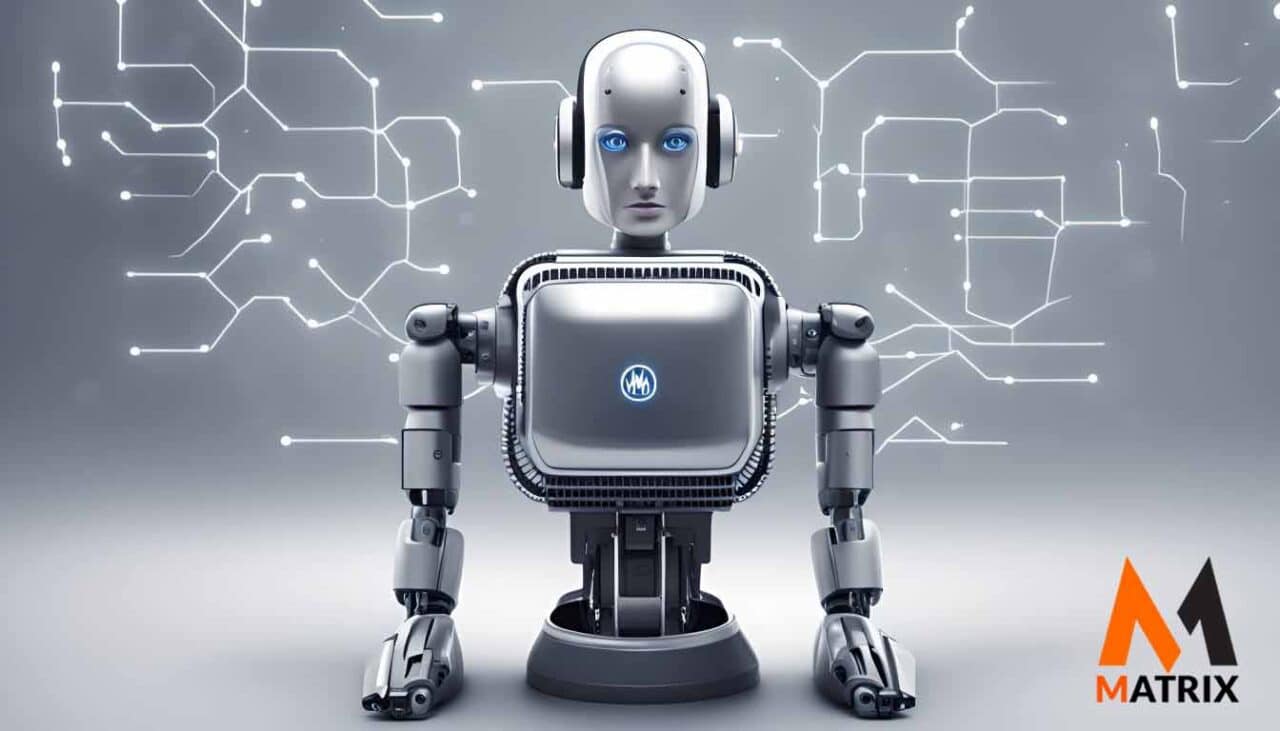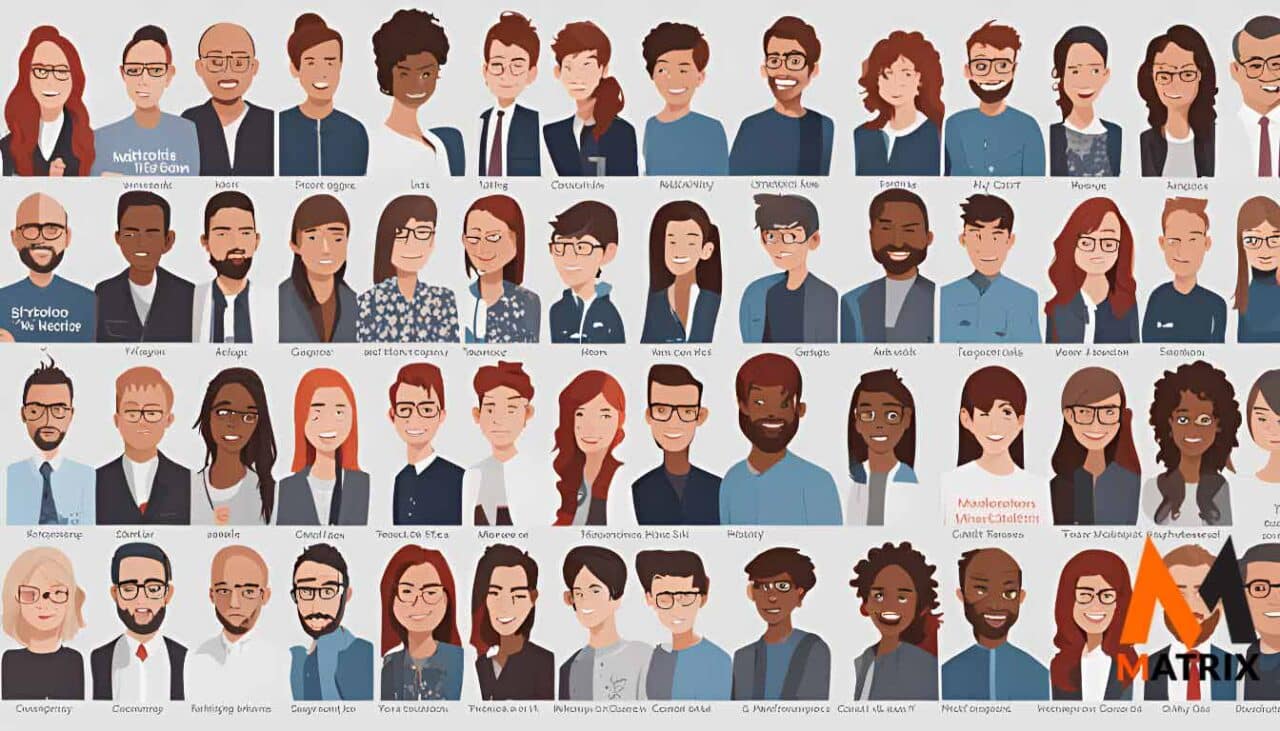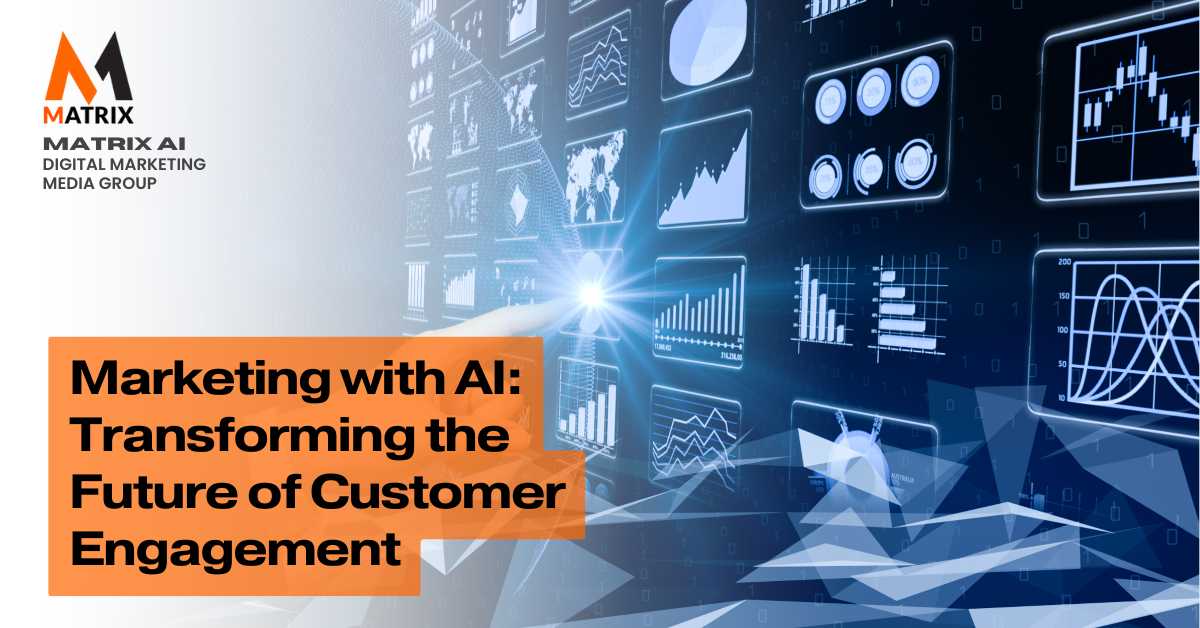Harnessing Artificial Intelligence to Revolutionize How Brands Connect with Their Audience
What if you could increase your marketing ROI by 30% while reducing costs by 25%?
This isn’t a distant dream but a tangible reality for companies leveraging artificial intelligence in their marketing strategies.
As AI continues to revolutionize industries, its integration into marketing is not just advantageous—it’s becoming essential for staying competitive.
Marketing with AI is like a symphony conductor. A conductor guides and coordinates the musicians in an orchestra to create a harmonious performance.
Similarly, AI orchestrates various marketing channels and tactics, ensuring they work together seamlessly to achieve the desired outcome.
The Efficiency of AI-Driven Insights for Marketing with AI
AI excels at analyzing vast amounts of data with incredible speed and accuracy. By sifting through customer behaviors, preferences, and interactions, AI provides marketers with actionable insights that would take humans months to uncover.
This allows for hyper-targeted campaigns that reach the right audience at the right time, significantly improving engagement and conversion rates. Imagine personalized ads, emails, and recommendations tailored to each individual’s interests, all crafted by AI’s data-driven precision.
OrchestraAI Marketing Platform – WATCH
OrchestraAI utilizes a compound AI agent architecture as an AI Agentic Platform. This architecture seamlessly integrates multiple specialized AI agents into a cohesive system, enabling it to tackle complex, multifaceted marketing tasks.
Enhancing Customer Experiences
Beyond data analysis, AI is redefining customer experiences. AI-powered chatbots can handle customer inquiries 24/7, providing instant, accurate responses. These virtual assistants improve customer satisfaction and free up human agents for more complex tasks.
AI can predict future trends and customer needs, enabling proactive engagement strategies. This predictive capability ensures your brand stays ahead of the curve, consistently meeting and exceeding customer expectations.
George Schildge, a US-based AI and business strategist, emphasizes that human learning and adaptability are more critical than ever in the age of AI. ‘In marketing, agentic systems like OrchestraAI are revolutionizing operations, streamlining processes, and optimizing efficiency,’ Schildge explains. ‘While AI will significantly transform the job landscape—diminishing or eliminating roles like content managers, programmers, developers, graphic artists, and social media managers—this shift challenges us to elevate human expertise and focus on higher-level thinking, creativity, and strategic innovation. To thrive alongside AI, humans must raise the knowledge bar and redefine their value in the workforce.'”
Maintaining the Human Touch
While AI brings remarkable efficiency and insights, the human touch remains irreplaceable. The key to successful AI integration is balance.
Let AI handle data-intensive tasks and initial customer interactions but ensure human oversight for quality control and emotional resonance. This hybrid approach leverages AI’s strengths while maintaining the authenticity and empathy that only humans can provide.
Marketing with AI isn’t just about adopting new technology; it’s about transforming how you connect with your audience.
By combining AI’s efficiency and predictive power with human creativity and empathy, you can create a marketing strategy that is both innovative and deeply engaging.
As AI continues to evolve, those who embrace its potential will shape the future of customer engagement.
Unlocking the Future: Marketing with AI

Introduction to AI in Marketing
Marketing is no exception in an era where technology evolves at lightning speed. Marketing with Artificial Intelligence (AI) has revolutionized the way businesses engage with their audiences. But what exactly does this entail?
At its core, marketing with AI involves leveraging machine learning, data analytics, and automated processes to enhance and personalize marketing strategies.
This innovative approach allows companies to predict consumer behavior, optimize campaigns, and drive more meaningful customer interactions.
The Power of Personalization
One of the most compelling aspects of AI in marketing is its ability to deliver personalized experiences at scale. Imagine receiving product recommendations that read your mind or tailored content that speaks directly to your interests.
AI algorithms analyze vast amounts of data—from browsing history to social media activity—to create highly targeted marketing messages. This not only improves customer satisfaction but also significantly boosts conversion rates.
Efficiency and Automation
Beyond personalization, AI streamlines and automates numerous marketing tasks, freeing up valuable time and resources.
From chatbots providing instant customer support to automated email campaigns triggered by user actions, AI handles repetitive tasks precisely and efficiently.
This automation enhances operational efficiency and allows marketing teams to focus on creative and strategic initiatives that drive business growth. Content Translation Services: A Competitive Advantage for Your Business
A Glimpse into the Future of Marketing with AI
As AI technology advances, the possibilities for marketing are virtually limitless.
Predictive analytics will become even more sophisticated, enabling marketers to anticipate trends and consumer needs with unprecedented accuracy.
The convergence of artificial intelligence (AI) with cutting-edge technologies, such as augmented reality (AR) and virtual reality (VR), is poised to revolutionize the way brands engage with their audiences.
The future of marketing is here, and AI powers it. Are you ready to embrace this exciting evolution?
The Future of Marketing: Why AI Matters Now More Than Ever

Transforming Consumer Engagement
In today’s rapidly evolving digital landscape, integrating artificial intelligence in marketing is not just an option; it’s a necessity. Consumers’ expectations for personalized and relevant brand interactions are higher than ever as they become increasingly sophisticated.
AI enables marketers to analyze vast amounts of data, uncovering insights that drive tailored experiences. This is crucial for standing out in a crowded marketplace where attention spans are fleeting.
Driving Efficiency and Innovation
The current economic climate demands efficiency and innovation. AI tools automate routine tasks, allowing marketing teams to focus on strategic initiatives that foster creativity and engagement.
By leveraging machine learning algorithms, brands can optimize campaigns in real-time, ensuring marketing budgets are spent wisely. This agility enhances performance and empowers CMOs to make data-driven decisions that lead to measurable outcomes.
Preparing for Marketing with AI
As we move forward, AI’s role in marketing will only grow. Companies that embrace this technology now will be better positioned to adapt to future trends and consumer behaviors.
The question isn’t whether to adopt AI but how quickly to integrate it into your marketing strategy. Engaging with AI today is not just about keeping up; it’s about leading the charge into a new era of marketing where innovation reigns supreme.
Curiosity piqued? Explore how AI can redefine your marketing efforts and propel your brand into the future. What is HubSpot Consulting?
Unlocking the Power of Predictive Analytics in Marketing with AI

What is Predictive Analytics?
Predictive analytics is one of the most fascinating marketing concepts powered by AI.
This involves using advanced algorithms and machine learning to analyze historical data and forecast future consumer behavior.
Businesses can tailor their marketing strategies by identifying patterns and trends to better meet their customers’ needs and desires.
Real-World Applications for Marketing with AI
Consider an online retailer that utilizes predictive analytics to enhance customer experience. By examining past purchase behavior, the AI can recommend products that a customer will likely buy next, creating tailored shopping experiences.
For instance, if a customer frequently buys outdoor gear, the system might suggest related items like hiking boots or camping equipment, driving both sales and customer satisfaction.
The Competitive Edge
Moreover, brands that leverage predictive analytics can optimize their advertising spend. By determining which customers are most likely to respond to specific campaigns, they can focus their resources on high-value targets.
Companies like Netflix and Spotify use these insights to make recommendations and create personalized content that keeps users engaged and returning for more.
In a rapidly evolving marketplace, harnessing the power of predictive analytics is not just an advantage; it’s becoming necessary for brands aiming to thrive in the digital age. Wouldn’t you want to be one step ahead of your customers?
The first major benefit of deploying Artificial Intelligence (AI) in marketing, particularly for Chief Marketing Officers (CMOs), is the significant enhancement in customer experience through personalization. Let’s delve into this benefit with supporting evidence:
Enhanced Customer Experience through Personalization
1. Personalization at Scale: AI enables marketers to personalize customer experiences at an unprecedented scale.
Traditional marketing methods need help to offer personalized content to a large audience due to the constraints of manual processes and limited data analysis capabilities.
AI bridges this gap by leveraging vast data to tailor messages, product recommendations, and offers to individual consumers.
- McKinsey Research (2020): A study by McKinsey highlighted that personalization can deliver five to eight times the ROI on marketing spend and lift sales by 10% or more. This underscores the ability of AI-driven personalization to enhance marketing effectiveness significantly.
- Epsilon Research (2018): Epsilon found that 80% of consumers are more likely to purchase when brands offer personalized experiences. This statistic reflects the critical role of personalization in driving consumer behavior and improving overall customer experience.
2. Improved Customer Insights: AI algorithms can analyze vast data sets from multiple sources (e.g., social media, transaction history, and browsing behavior) to uncover deep customer insights. These insights enable CMOs to understand customer preferences, behaviors and needs more accurately, leading to more effective marketing strategies.
- Harvard Business Review (2018): HBR reported that companies using AI in marketing can build a 360-degree view of their customers, providing a holistic understanding essential for effective personalization.
- Gartner (2021): According to Gartner, organizations that leverage AI for customer analytics gain deeper insights into customer journeys and can predict future behaviors more effectively, enhancing their ability to meet customer needs proactively.
3. Dynamic Content and Product Recommendations: AI-powered tools can dynamically generate and deliver personalized content and product recommendations in real-time. This effectively captures consumer interest and increases the likelihood of conversion by presenting the most relevant options to each individual.
- Salesforce found that AI-driven recommendations can increase conversion rates by up to 30%. This significant increase underscores how personalized recommendations improve the customer experience and drive sales.
- Accenture Strategy: Accenture reported that 91% of consumers are likelier to shop with brands that provide personalized offers and recommendations, emphasizing the importance of tailored marketing interactions.
4. Enhanced Customer Engagement: AI-driven chatbots and virtual assistants provide immediate, personalized responses to customer inquiries, significantly enhancing engagement and satisfaction. These tools can handle many customer interactions and provide consistent and accurate information.
- Chatbot Report by Oracle: This report highlighted that 80% of businesses plan to use chatbots by 2020, with many already reporting increased customer engagement and satisfaction due to these AI systems’ immediate and tailored responses.
- PwC’s research found that 72% of business executives believe that AI will be a business advantage, particularly noting improvements in customer interaction quality and speed through AI systems.
AI’s ability to enhance customer experience through comprehensive and scalable personalization represents a significant benefit for CMOs.
By leveraging AI, marketers can offer highly tailored experiences that meet individual customer preferences, driving higher engagement, satisfaction, and business success. Free HubSpot CMS Tools
Testimonials about Marketing with AI
Testimonial 1:
Sophia Martinez, Chief Marketing Officer at TechFusion Inc.
“Integrating AI into our marketing strategies has been a game-changer for us. The level of personalization we can achieve with AI-driven insights is unparalleled.
We can tailor our messages to customer preferences and predict future trends accurately. This has boosted our customer engagement and significantly improved our ROI. AI is no longer just a tool; it’s an indispensable part of our marketing arsenal.”
Testimonial 2:
Dr. Alan Chen, Professor of Marketing Analytics at Stanford University
“Artificial Intelligence is revolutionizing the marketing landscape by providing unprecedented data analysis and customer insights.
AI algorithms can process vast amounts of data in real-time, enabling marketers to make informed decisions faster.
Moreover, AI-driven predictive analytics allows for more precise targeting, helping brands to allocate resources more effectively. For any CMO looking to stay ahead of the curve, adopting AI in marketing is not just an option—it’s a necessity.”
Testimonial 3:
Lena Patel, Head of Digital Marketing at BrightWave Solutions
“Since implementing AI tools, our campaign efficiency has skyrocketed. AI helps us automate routine tasks, allowing our team to focus on creative and strategic initiatives.
From chatbots that enhance customer service to sophisticated algorithms that optimize our ad spend, AI has streamlined our operations and elevated our marketing efforts to new heights. The real-time data and analytics capabilities provide us with actionable insights that drive better decision-making and, ultimately, better results.”
Marketing with AI has become increasingly essential for businesses seeking to enhance customer engagement, optimize campaigns, and make data-driven decisions. Here are some best practices for leveraging AI in marketing, along with two examples of successful implementations:
Best Practices for Marketing with AI:
- Personalization at Scale: Utilize AI algorithms to analyze customer data and deliver personalized content, offers, and experiences. Personalization can significantly improve engagement rates and conversion.
- Predictive Analytics: Leverage AI to analyze historical data and predict future customer behavior. This helps anticipate trends, improve inventory management, and optimize marketing strategies.
- Automation: Implement AI-driven automation tools for email marketing, social media posting, and ad targeting tasks. This will save time and ensure consistency in messaging.
- Natural Language Processing (NLP): Use NLP for sentiment analysis, chatbots, and customer feedback analysis. This helps understand customer needs and improve service.
- A/B Testing and Optimization: Automate the testing of different marketing strategies and use AI to determine the best-performing elements, allowing for continuous optimization.
Examples of Successful Implementation:
Example 1: Spotify

Implementation: Spotify uses AI and machine learning algorithms extensively to deliver personalized music recommendations to its users.
Spotify creates custom playlists like “Discover Weekly” tailored to individual preferences by analyzing listening habits, user interactions, and collaborative filtering.
Success: This level of personalization has significantly contributed to user engagement on the platform, leading to higher retention rates.
The tailored recommendations enhance user satisfaction and promote music discovery, driving more streams and increasing revenue for artists.
Example 2: Coca-Cola and AI Marketing
Overview: Coca-Cola implemented AI-driven personalized marketing strategies to enhance consumer engagement and drive sales. The company used machine learning algorithms to analyze customer data, such as purchasing behavior, social media interactions, and demographic information.
Implementation: Coca-Cola has successfully implemented AI for market research and customer interaction through various channels. They utilize AI-driven analytics to gauge customer sentiment and preferences from social media and other feedback channels. Additionally, they have used AI to optimize their advertising campaigns by analyzing which demographics respond best to specific ads.
Success: By implementing these AI-driven strategies, Coca-Cola has been able to craft targeted marketing campaigns that resonate with its audience, leading to improved marketing ROI. AI insights have also enabled it to anticipate market trends, allowing for agile responses to consumer demands, thus maintaining its competitive edge in the beverage industry.
By following best practices in AI marketing and learning from successful implementations like Spotify and Coca-Cola, businesses can leverage artificial intelligence to improve customer engagement, optimize their campaigns, and drive significant business results.
Here are two real-life examples of how organizations have successfully implemented AI in their marketing strategies, along with their results and analysis that a Chief Marketing Officer (CMO) would find interesting:
Coca-Cola’s Personalized Marketing Campaign
Results:
- Increased Engagement: The AI system allowed Coca-Cola to create personalized content and advertisements for different customer segments, leading to a 20% increase in social media engagement.
- Sales Growth: By leveraging AI for targeted promotions, Coca-Cola reported a 10% increase in sales during the campaign period compared to the previous year.
- Customer Insights: AI provided insights into consumer preferences, revealing new trends that helped in product development and refinement.
Analysis: Coca-Cola’s use of AI in its marketing strategy highlights the importance of personalization in today’s digital landscape. Delivering tailored content effectively increased customer engagement and loyalty, translating into higher sales.
The insights gathered through AI also positioned them favorably for future product innovation. This example illustrates the necessity for companies to invest in AI capabilities to improve operational efficiency and enhance customer experience.
Example 2: Sephora’s Virtual Artist
Overview: Sephora launched its Virtual Artist app, which employs AI-driven augmented reality (AR) to allow customers to try makeup virtually. Using facial recognition technology, the app recommends products based on customer preferences and skin tones.
Results:
- Increased App Usage: The app registered over 15 million downloads within six months of launch.
- Improved Conversion Rates: Sephora reported a 94% increase in conversion rates for users who interacted with the Virtual Artist compared to those who did not.
- Enhanced Customer Satisfaction: Customer feedback indicated a 90% satisfaction rate, with many users mentioning how the app simplified their shopping experience.
Analysis: Sephora’s implementation of AI stands out as a technological innovation and a strategic move to enhance customer engagement and streamline the purchasing process.
By providing a virtual try-on experience, they eliminated the barriers to online shopping for makeup products, which often need more certainty about how products would look in person. Furthermore, the significant boost in conversion rates shows that leveraging AI can transform user experience and buying behavior.
For CMOs, this case exemplifies the importance of using AI and AR to create immersive experiences that resonate with customers, driving sales and loyalty.
Both examples reflect AI’s pivotal role in shaping customer-centric, data-driven, and innovative marketing strategies. For CMOs, this represents the potential for significant ROI and competitive advantage by adopting AI technologies in their marketing efforts.
Unleash the Power of AI in Marketing with Matrix
Curious about how artificial intelligence can supercharge your marketing strategies?
Imagine harnessing data-driven insights and automating customer interactions to engage your audience like never before. Welcome to the Matrix for Marketing with AI, a systematic approach to revolutionizing your marketing efforts.
Step 1: Data Collection and Analysis
The foundation of the Matrix begins with comprehensive data collection and analysis. Dive deep into your customer databases, social media interactions, and market trends.
Using advanced AI algorithms, uncover patterns and preferences that would take humans months to decipher.
Envision tools like predictive analytics generate actionable insights. They allow you to anticipate market shifts and customer needs, putting you ahead of the competition.
Step 2: Personalization and Customer Segmentation and AI in Marketing
Once you’ve amassed valuable data, the next phase involves personalization and precise customer segmentation. Say goodbye to the one-size-fits-all approach.
AI-powered systems can segment your audience based on behavior, demographics, and purchasing patterns.
Craft personalized marketing messages and offers that resonate with each segment. Picture your customers receiving tailored content that speaks directly to their interests and needs, enhancing their engagement and loyalty.
Step 3: Automated Campaign Management
Now, elevate your marketing campaigns with automation. Implement AI-driven tools to manage your campaigns across multiple platforms effortlessly. Automate repetitive tasks like email marketing, social media posting, and ad placements.
This not only saves time but also ensures consistency and optimal timing. Imagine launching a new product with automated, strategically timed advertisements and personalized emails, creating a seamless and impactful customer journey.
Embrace the Matrix for Marketing with AI to transform your strategies, making them smarter, faster, and more effective. As you navigate these steps, watch your marketing efforts evolve into a finely tuned machine, driving higher engagement, conversion rates, and business growth. Are you ready to step into the future of marketing?
Marketing with AI: Transforming the Future of Engagement
Unleashing the Power of Data
In today’s digital landscape, artificial intelligence (AI) is a powerful tool for marketers, enabling them to harness vast amounts of data like never before.
From predictive analytics to customer segmentation, AI allows businesses to uncover valuable insights about consumer behavior, preferences, and trends. By analyzing this data, marketers can craft personalized campaigns that resonate with their target audience, enhancing customer engagement and loyalty.
Automation and Efficiency
AI provides insights and automates routine tasks that traditionally consumed significant time and resources.
Chatbots improve customer service by providing instant responses to queries, while automated content creation tools help generate relevant marketing materials quickly.
This means that teams can focus more on strategic planning and creative imagination than mundane tasks, increasing overall productivity.
Ethical Considerations
As with any powerful technology, using AI in marketing comes with ethical considerations. Marketers must navigate data privacy, transparency, and algorithmic bias issues. But AI engineering and AI grounding clean all this up.
Understanding and addressing these concerns is crucial in building consumer trust while leveraging AI’s capabilities responsibly.
The Future is Now
Integrating AI into marketing strategies is not just a trend but a fundamental shift in how brands connect with consumers.
As AI technology evolves, those who embrace it will stay ahead of the competition and create more meaningful and impactful interactions with their audiences. Are you ready to take your marketing strategy to the next level with AI?



